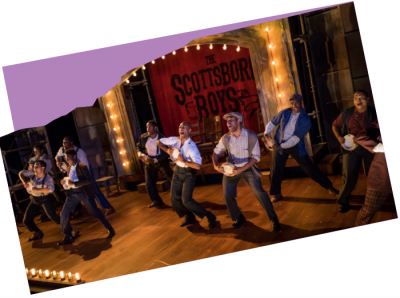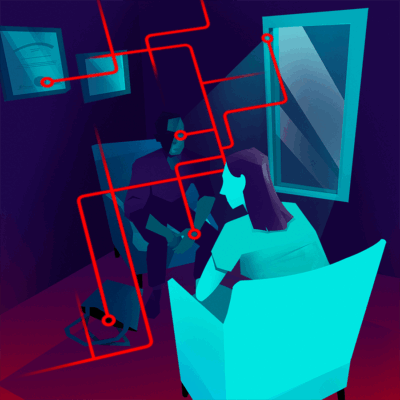Your donation sets the stage for a new season of Boston's most intimate, entertaining and provocative plays and musicals. Our shows make powerful connections with our audiences-- and they are only possible because of you.
Fun Home: Queer History, Memory, and Finding Our Truth
Fun Home: Queer History, Memory, and Finding Our Truth
“My father died soon after I came out to my family as a lesbian. It freaked everyone out. My mother [had] told me that my father was gay. Soon after that he was hit by a truck. So [Fun Home] is all about this sorting out what happened in that strange little knot of sexual coming of age and death and trauma.”1 – Alison Bechdel
For musical theatre audiences, the show Fun Home made Alison Bechdel a household name; but for a dedicated lesbian and queerfanbase, the artist has been a cultural icon for decades. Her serial comic strip Dykes to Watch Out For ran from 1983-2008, a remarkable 25-year, multi-syndicated lifetime. A panel in 1985 would eventually help secure the internet phenomenon of “The Bechdel Test,” in which films and television shows were judged for their feminist bona fides based on how long it took before the female characters talked about men. In this sense, Bechdel carries on a legacy that was impossible for her forebears.
In July 1980, a few months after Alison Bechdel’s coming out to her family and her father Bruce Bechdel’s subsequent suicide, queer life in America was moving through its own tumultuous shift. The 1970s were a post-Stonewall whirlwind that included the growth of gay neighborhoods in major cities like New York, Chicago, Boston, and San Francisco, and the explosion of queer nightlife in those cities; the formation of national organizations dedicated to queer liberation; the opening of gay student unions at progressive colleges and universities (including Oberlin College’s Gay Liberation Front in 1971); and the founding of archives and collections dedicated to cultural validation and preservation of queer history. The late 1970s and early 1980s appeared to be the beginning of a new kind of struggle for LGBTQ+ Americans: the assassination of San Francisco City Supervisor Harvey Milk by Dan White, the election of social conservative Ronald Reagan to the presidency, and the first signs of a “rare cancer” among gay and bisexual men in New York and San Francisco.
While Bechdel’s graphic memoir Fun Home only hints at the macrocosm outside of her personal and familial circumstances, these tectonic shifts for queer people in America are implicitly connected to the characters’ experiences. The distinction between Bruce’s discovery of his sexuality in a preliberation, closeted society and Alison’s recognition and public disclosure of her lesbianism highlights the widening generation gap between queer people. Alison has the ability to come out, find a queer coterie at her college, and bring a girlfriend home, each a considerably bold assertion of identity in comparison to her father’s clandestine, shame-based sexuality. According to Bechdel, Bruce’s response to Stonewall was “to burrow even deeper underground,” a “prisoner of his own generation.”2 In creating the musical version of Fun Home, composer Jeanine Tesori had to imagine these generational communic-ation discrepancies within the world of musical theatre. As she explained in a 2015 interview, “They were characters who could not find a way to sing and children who were trying to sing the song of the parents who didn’t have the form and structure to sing.”3
Tesori and writer/lyricist Lisa Kron were tasked with scoring a show that depicted a family who primarily communicates in the realm of the intellectual, while also expressing to the audience their inner emotional lives through song. As Tesori described, “The graphic novel is filled with thousands of cells that tell stories within themselves. So how is it going to be in a long arc instead of in these little bits and pieces? And how are we going to tell that in a theatrical way? It took the full five years to really figure that out.”4 Indeed, Tesori and Kron faced challenges of both content and form in translating Fun Home to the musical stage.
While Tesori and Kron adapted the narrative, they focused on maintaining the spirit of the graphic novel and honoring Bechdel’s story, while also taking some liberties with the structure and content. In an interview, Kron reflected: “When we first sent an early draft of it to Alison, I said, ‘I just want to remind you, it’s going to be really weird because we had to make things up and change details and put things together.’ … But then she wrote us back and said, ‘Even the things you made up feel true to me.’ That was a big relief.”5
At the core of both the graphic novel and the musical Fun Home is the desire to acknowledge and accept one’s truth. Part-way through the show, Alison asks, “What would happen if we spoke the truth?” This question is at the core of Bechdel’s brave, daunting journey through her memories, which Kron and Tesori have artfully excavated and adapted into an evocative work of musical theatre.
 Past Productions
Past Productions JOB
JOB The Antiquities
The Antiquities Swept Away
Swept Away




